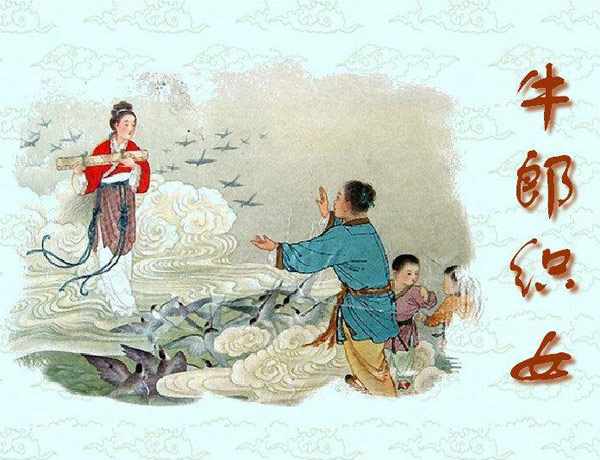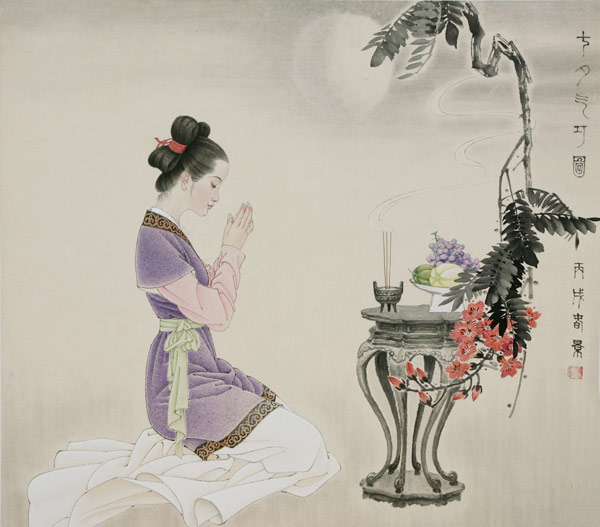Double Seventh Festival, on the 7th day of the 7th lunar month on the Chinese calendar, is a traditional Chinese festival full of romance. In 2011, it will be celebrated on August 6.
It is also known as Magpie Festival, when the Niulang (Cowherd) and Zhinü (Weaver Maid) in heaven would meet at the Magpie Bridge. On Mid-summer Night, the sky is dotted with stars, and people can see the Milky Way spanning from the north to the south. On each bank of it is a bright star, which sees each other from afar. They are the Niulangand and Zhinü, and about them there is a beautiful love story passed down from generation to generation.
Long, long ago, there was an honest and kind-hearted fellow named Niulang, who lived by himself herding cattle and farming. One day, he came across a beautiful girl – Zhinü, the seventh daughter of the Goddess, who came down secretly to earth. Zhinü soon fell in love with Niulang, and married him. They lived a happy life and gave birth to a boy and a girl. Niulang worked in the fields, and Zhinü wove at home to help support the family. Incidentally, it was believed that a day in heaven amounted to a year on earth. Unfortunately, the Goddess of Heaven found out that Zhinü had married a mere mortal. She was furious and ordered Zhinü to return to heaven. On Earth, Niulang was very upset that his wife had disappeared. Suddenly, his ox began to speak, saying that soon it was to die, and if cowherd killed it and put on its hide, he would be able to go up to Heaven to find his wife. Crying bitterly, he killed the ox, put on the skin, and carried his two beloved children off to Heaven to find Zhinü. Seeing the cowherd closing in, the Goddess took out her hairpin and drew a line across the sky in front of Niulang. Instantly, it became a raging river of stars, known to the Chinese as the Silvery River, and the West as the Milky Way. For the wide river in the sky, the Niulang and Zhinüwere separated on the two banks forever. Their loyalty to love touched magpies, so tens of thousands of magpies came to build a bridge for them to meet on the 7th day of the 7th lunar month every year.
Scholars have shown that the Double Seventh Festival originated from the Han Dynasty (206 BC-AD220). On the festival, young girls would beg for intelligence and deft needlework from Zhinü. In the yard, Melons and seasonal foods would be placed under the moon as an offering. So, the day was considered to be the Festival to Plead for Skills in the past. And now, Double Seventh Festival is also called Chinese Valentine's Day for the love story between Niulang and Zhinü.
For more information about Chinese cultue, please view http://www.easytourchina.com/http://www.easytourchina.com/
It is also known as Magpie Festival, when the Niulang (Cowherd) and Zhinü (Weaver Maid) in heaven would meet at the Magpie Bridge. On Mid-summer Night, the sky is dotted with stars, and people can see the Milky Way spanning from the north to the south. On each bank of it is a bright star, which sees each other from afar. They are the Niulangand and Zhinü, and about them there is a beautiful love story passed down from generation to generation.
Long, long ago, there was an honest and kind-hearted fellow named Niulang, who lived by himself herding cattle and farming. One day, he came across a beautiful girl – Zhinü, the seventh daughter of the Goddess, who came down secretly to earth. Zhinü soon fell in love with Niulang, and married him. They lived a happy life and gave birth to a boy and a girl. Niulang worked in the fields, and Zhinü wove at home to help support the family. Incidentally, it was believed that a day in heaven amounted to a year on earth. Unfortunately, the Goddess of Heaven found out that Zhinü had married a mere mortal. She was furious and ordered Zhinü to return to heaven. On Earth, Niulang was very upset that his wife had disappeared. Suddenly, his ox began to speak, saying that soon it was to die, and if cowherd killed it and put on its hide, he would be able to go up to Heaven to find his wife. Crying bitterly, he killed the ox, put on the skin, and carried his two beloved children off to Heaven to find Zhinü. Seeing the cowherd closing in, the Goddess took out her hairpin and drew a line across the sky in front of Niulang. Instantly, it became a raging river of stars, known to the Chinese as the Silvery River, and the West as the Milky Way. For the wide river in the sky, the Niulang and Zhinüwere separated on the two banks forever. Their loyalty to love touched magpies, so tens of thousands of magpies came to build a bridge for them to meet on the 7th day of the 7th lunar month every year.
Scholars have shown that the Double Seventh Festival originated from the Han Dynasty (206 BC-AD220). On the festival, young girls would beg for intelligence and deft needlework from Zhinü. In the yard, Melons and seasonal foods would be placed under the moon as an offering. So, the day was considered to be the Festival to Plead for Skills in the past. And now, Double Seventh Festival is also called Chinese Valentine's Day for the love story between Niulang and Zhinü.
For more information about Chinese cultue, please view http://www.easytourchina.com/http://www.easytourchina.com/


No comments:
Post a Comment